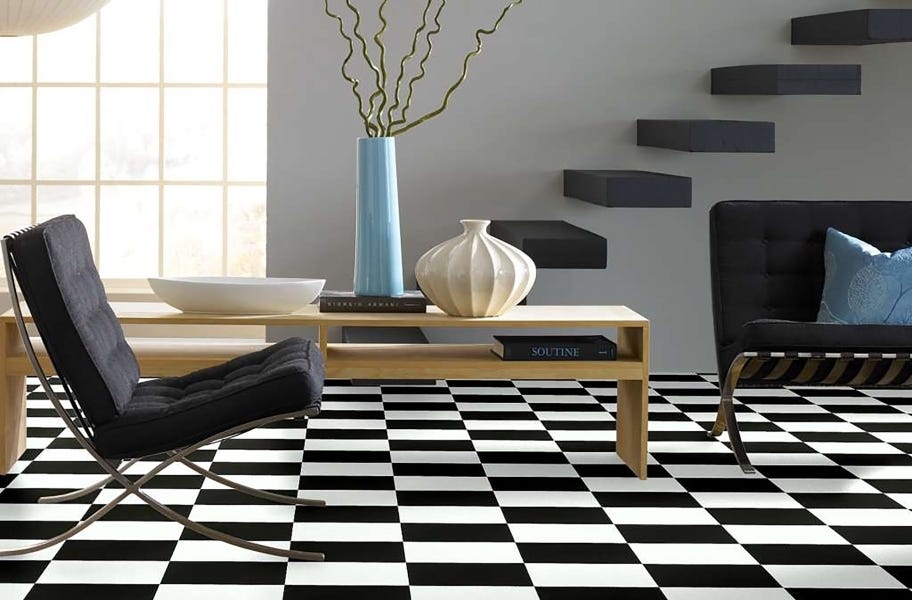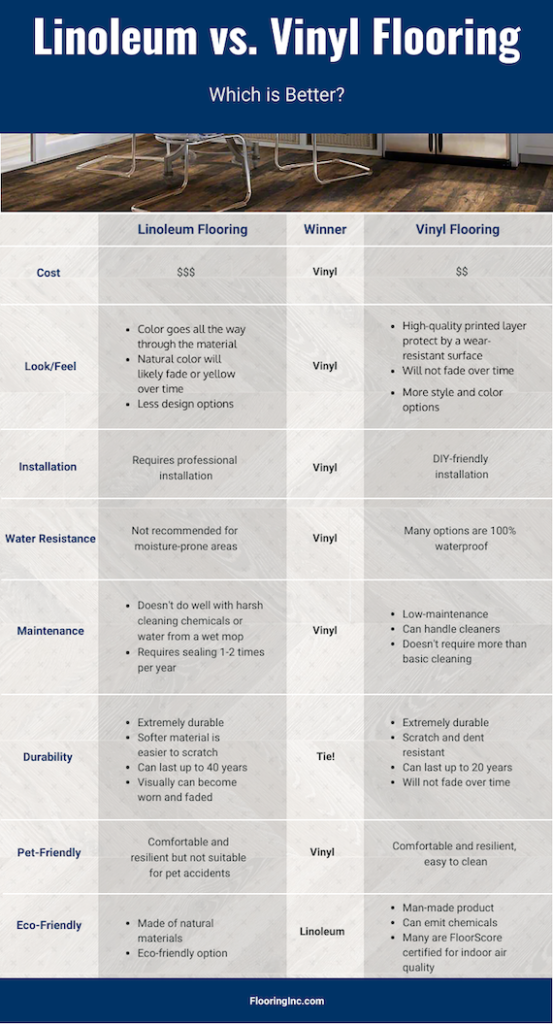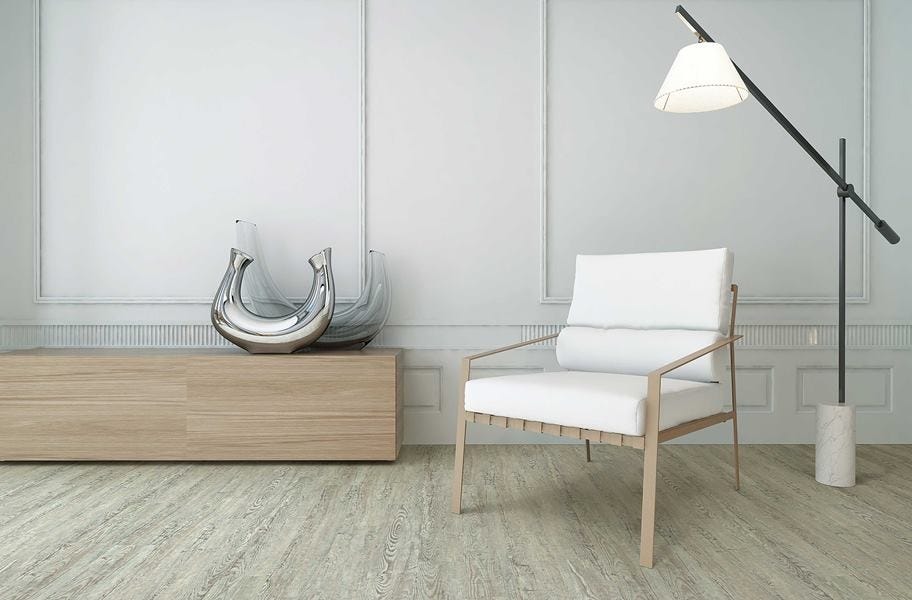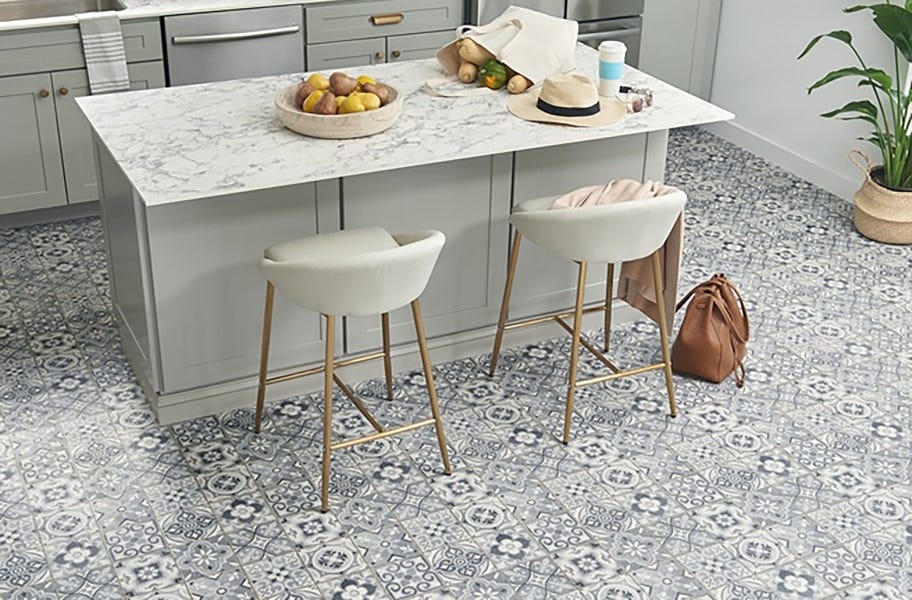
Wait, vinyl and linoleum aren't the same thing? It’s true. While they might seem similar, there are crucial differences between linoleum vs. vinyl.
Flooring is a big deal in your home, so you want to know exactly what you're getting. The challenge once you start browsing is that everything can begin to look the same, so it's important to know what you want in your flooring and which product is best for your needs.
We're here to help you discover just that. In this guide, you'll learn how to tell the difference between linoleum and vinyl flooring, discover which is more cost-effective, and find out which will meet your design needs.
https://youtu.be/ONs4CHk5bWQ
What is Linoleum Flooring?
Linoleum flooring is made from all-natural materials, including linseed oil, rosin, broken down wood, and others. This is one of linoleum's highest selling points – it’s all-natural without emitting any harmful chemicals.
What is linoleum flooring best known for? Resiliency – the floor is flexible and has some "give" to it. That makes it possible to install linoleum in areas where harder flooring options like tile and natural hardwood would not do well. Plus, it can last up to 40 years.
Linoleum might be best known for its sheet form, but it’s also available in tiles and planks. Sheets have to be glued down and virtually always require a professional to get the job done. On the other hand, linoleum tiles and planks feature interlocking tongue-and-groove edges, allowing you to float the linoleum over the subfloor without any glue, just like vinyl planks and tiles.
Having been around since the 1800s, linoleum is one of the oldest and most classic flooring options on the market. But in the 1950s, the classic linoleum kitchen (you know, the black-and-white checkered look) started to become less sought-after.
Why? Well, vinyl was new. And cheaper. Thus began the decline in linoleum's popularity and the confusion of whether vinyl and linoleum are the same thing.
Linoleum Flooring Pros
What are the perks of choosing a linoleum floor? Here's what you can enjoy:
- Made of natural materials: Linoleum floors consist of a naturally occurring substance called linseed oil, which is extracted from flaxseeds. Linseed oil is then mixed with wood flour, cork dust, and other natural and renewable materials.
- Anti-static properties: Being made of biodegradable material, linoleum floors have low static resistance. This is especially important for commercial properties where static can be harmful to employees or equipment.
- Resilient and comfortable underfoot: Linoleum is known for being a resilient floor with a cushioning effect.
- Heat insulating: No need to mess with an underlayment, linoleum flooring rolls will trap in the heat all on their own.
- Anti-microbial: This material is anti-bacterial and hypoallergenic, a great choice for everyone in the home.
- Long-lasting: With proper care and maintenance, linoleum floors can last up to 40 years!
- Consistent color: Patterns and colors are present throughout the tile or sheet, so the design will show even in worn-down spots. While this may limit some design options, you won't have to worry about the color fading.
Linoleum Flooring Cons
What are the disadvantages of linoleum flooring? Here are a few things to consider:
- Susceptible to water damage: If you're using linoleum in a moisture-prone area, such as a bathroom or kitchen, the floor needs to be sealed periodically. Flooding and even excessive humidity can severely damage linoleum flooring.
- Durability: Because linoleum is so soft, it’s easier to scratch and gouge. Sharp edges such as high heels or the edges of furniture can damage the surface if you’re not careful.
- Maintenance: Linoleum must be sealed one or two times per year. If your floor doesn't have a coating, linoleum will also need waxing every two or three years.
- Not DIY-friendly: Installing linoleum sheets requires a professional installer. Since it's such a stiff material, installing linoleum is not typically a DIY project.
- Yellowing: Linoleum can gradually yellow as it gets older or if it’s not cleaned with the proper products, so even though it can last for many years, that age can start to show.
What about asbestos?!
Don't worry, the use of asbestos in linoleum ended in the 1970s! Present-day linoleum no longer includes asbestos, so rest assured, you are safe!
What is Vinyl Flooring?
Vinyl is a more durable flooring option made from PVC. Because it’s made from synthetic material, vinyl is a cheaper alternative to linoleum. Vinyl flooring encompasses a range of options, including vinyl sheets, planks, and tiles.
It became more popular in the 1960s, and that popularity has only grown since. In addition to the more budget-friendly price, vinyl offers cutting-edge stone looks, wood looks, and decorative designs.
Vinyl flooring also gets a lot of attention because it’s so durable while maintaining some softness underfoot. The printed visual layer is protected by a durable surface wear layer. Some vinyl flooring is also 100% waterproof. That’s thanks to a wood-plastic composite (WPC) or stone-plastic composite (SPC) core layer included in waterproof vinyl planks and tiles.
Vinyl planks and tiles are pretty distinct from linoleum, but sheet vinyl is a bit tricker. The biggest reason people confuse vinyl and linoleum is that they can both come in sheet form. However, though they might look similar, there are big differences between linoleum sheets and vinyl sheets.
The new generation of vinyl sheets offers convincing natural wood looks, stone looks, and even decorative looks. Today vinyl sheets also often come with durable fiberglass backings that make installation more DIY-friendly, because you can simply float the sheet over your floor – no adhesive necessary.
| Related Content >> Vinyl Flooring Trends |
Vinyl Flooring Pros
What are the advantages of vinyl flooring? With this resilient floor, you can expect to enjoy the following benefits:
- Easy, DIY installation: Most vinyl flooring planks and tiles are an interlocking or "floating" installation, which makes for an easy DIY project for homeowners. Vinyl sheets with fiberglass backing are also simple to install on your own.
- Easy to maintain: Vinyl flooring is easy to clean and care for. Especially if you choose a waterproof option, the floor basically does the hard work for you! All you need is the occasional vacuum and damp mop to keep your vinyl sparkling.
- Resilient and comfortable underfoot: If you're the type to be on your feet most of the day, resilient vinyl floors are a must. This material is comfortable and easier on your joints and feet than other hard floor types, such as tile.
- Large variety in styles and looks: Today's vinyl mimics wood and stone looks better than ever before. You can find a wide variety of luxury vinyl flooring colors, patterns, and textures.
- Waterproof options: We're talking 100% waterproof! Your vinyl floors can be totally submerged without being damaged.
Vinyl Flooring Cons
What are the disadvantages of vinyl floors? Here are a few things to consider:
- Production causes more of an effect on the environment: Vinyl flooring takes more energy and non-renewable resources to construct than linoleum.
- Shorter lifespan: These floors typically last up to 20 years.
- The image is only on the surface: While you have several design options with vinyl, the aesthetic is only as strong as the wear layer over the print. The color may fade over time as the top layer wears down.
| Related Content >> Vinyl Flooring Buying Guide |
Vinyl vs. Linoleum Flooring: The Showdown
There are a lot of factors to consider when trying to determine whether sheet vinyl or linoleum is the better flooring for you. Here’s some insight from flooring expert, Bryan Schwieger.
"They're both extremely durable, but they're made from different ingredients. Another big difference is the installation. Linoleum always requires a full-spread adhesive, and if it's not installed correctly, there can be challenges. Vinyl comes with more ease of installation and ease of maintenance." - Bryan Schwieger, US Floors
That’s a good start, but you might need to break things down even more to get the answer. Let’s get started!
| Related Content >> Laminate vs. Vinyl Flooring |

Cost
Typically vinyl is less expensive than linoleum upfront. But it's important to remember that linoleum can last sometimes twice as long as vinyl, depending on the type, manufacturer, and the type of traffic it receives. That being said, linoleum does tend to wear over time, especially when it's not properly cared for.
Winner: Vinyl
Look/Feel
Both linoleum and vinyl offer realistic wood and stone looks, but there are a few differences. Vinyl uses printed imagery to create a realistic image on top of the plank (or tile, or sheet) similar to laminate flooring, while in linoleum, the color goes all the way through the tile. This means that linoleum will maintain its color (although fading and yellowing may occur), whereas vinyl begins and ends with that image layer, as far as looks go.
Vinyl comes with more style and color options (if you can dream it, they can print it!), while linoleum offers less variety. Vinyl's color does not go all the way through the floor, but it also doesn't fade as much over time (unless it's frequently exposed to direct sunlight).
With proper care, vinyl can maintain its look until it's time to replace your floor, whereas we've all seen fading linoleum. It ain't pretty.
Winner: Vinyl
Installation
When it comes to tiles and planks, vinyl and linoleum are practically tied in terms of installation difficulty. Both options interlock, allowing you to “float” the floor without using any glue.
Those similarities disappear when you look at the installation options for linoleum sheets and vinyl sheets. A linoleum sheet has to be glued down, and the stiffer material can be hard to work with, which is why professional installation is recommended. On the other hand, newer vinyl sheets with fiberglass backings are way more DIY-friendly. If you’re installing it at home, you can just spread out the sheet, and you’re done!
Winner: Vinyl
| Related Content >> How to Install Vinyl Flooring |
Water Resistance
Both vinyl and linoleum are versatile floors, but vinyl is the winner when it comes to moisture-prone areas. You can install 100% waterproof vinyl in your bathroom or basement without having to worry about moisture damage.
You can’t say the same thing for linoleum. It is only water-resistant and does not do well with large amounts of liquids. Even when excessive humidity the edges and corners can start to curl up.
Winner: Vinyl
Maintenance
Vinyl is one of the lowest maintenance floors on the market. It can handle harsher cleaners (although you only need something gentle). Other than basic cleaning, no other work is required.
Linoleum, on the other hand, can be a bit delicate. It can't take harsh cleaning chemicals or large amounts of water from a wet mop. Linoleum also needs to be sealed one or two times per year. Some say it's even as finicky as traditional hardwood.
While the basic maintenance is not a huge deal, vinyl is definitely the easier option.
Winner: Vinyl
| Related Content >> How to Clean Vinyl Floors |
Durability
Both vinyl and linoleum are extremely durable flooring options, especially with recent technological advancements in vinyl flooring. Linoleum will typically hold up longer, but visually, it will become worn and faded.
Linoleum is made from a softer material, so it’s slightly easier to scratch and gouge, but this damage isn’t obvious. Many vinyl options (especially SPC rigid core vinyl) offer dent-resistance, waterproof cores, and durable wear layers.
Winner: Tie
Pet Friendly
We're giving vinyl flooring the win for pet approval.
While both are resilient floors that are comfortable for pets, the owners benefit more from vinyl. Waterproof vinyl floors especially are best for pet owners.
Pets come with accidents, muddy paws, and messy water bowls, so you need a floor that's easy to clean. Vinyl flooring handles water and liquids better than linoleum and makes cleaning up after your furry friends a cinch.
Winner: Vinyl
| Related Content >> Pet-Friendly Flooring Buying Guide |
Eco-Friendly
It's linoleum's turn in the spotlight! Linoleum is made of 100% natural materials and is known for being an eco-friendly flooring option. However, to be fair, vinyl has come a long way in terms of its eco-friendliness. It's certainly not the chemically-laden floor you might imagine from the ‘70s.
Vinyl is still a man-made product and it does contribute to some pollution. Additionally, some vinyl floors can emit chemicals, which is less than ideal. On the flip side, many vinyl flooring options are FloorScore certified for indoor air quality, and many are made in the USA with higher sustainability standards.
Winner: Linoleum
Linoleum vs. Vinyl Flooring: Which is Better?
In the end, the best choice for you depends on your needs and priorities.
While vinyl takes the top score in our flooring face-off, the winner of linoleum vs. vinyl flooring is really up to you. Both are long-lasting, resilient floors that are fairly cost-effective.
Vinyl flooring is DIY-friendly and comes with more design options, while linoleum floors are made from natural products and can last up to 40 years.
Now that you have all the information, the rest is up to you! Which categories are more important? Only you can answer that. But if vinyl is your choice, we’ve got you covered.
ORDER FREE SAMPLES SHOP ALL VINYL







It really depends which vinyl product you're choosing. For <a href="https://www.flooringinc.com/vinyl/planks/tritoncore-waterproof-vinyl.html?utm_source=blog&utm_campaign=Linoleum%20vs%20Vinyl&utm_medium=comment" target="_blank" rel="nofollow noopener noreferrer">TirtonCORE</a> and other WPC (waterproof core) options, you can easily put them over tile without seeing the imperfections from the floor underneath. However, with thinner options, we definitely do not recommend it unless you sand and level the floor. It's always best to check the manufacturer guidelines to make sure because it often varies from product to product